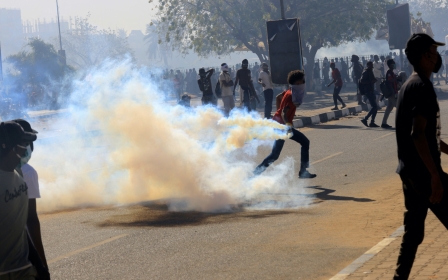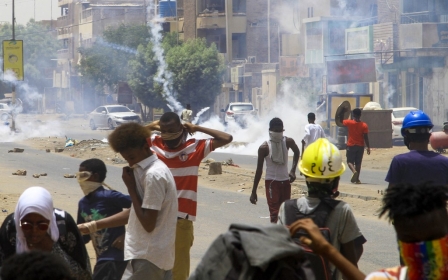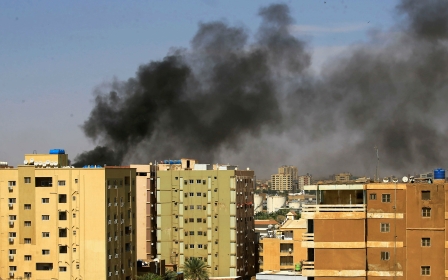Sudan: Ten killed as pro-democracy protests sweep country
Sudanese protesters rallied again Friday and security forces fired tear gas at them, a day after a mass demonstration drawing tens of thousands was met with the deadliest violence so far this year.
Hundreds of activists massed near the presidential palace in the capital Khartoum, after at least 10 people were killed during rallies against a military takeover led by army chief Abdel Fattah al-Burhan last October.
At least seven of those killed were shot in the chest or the head, the Central Committee of Sudanese Doctors said.
One of them was a minor, the doctors said, killed by "a bullet in the chest".
The committee noted the "very large number of injuries" - currently thought to be at least 100 - caused by live fire, as reports of serious violence came in from all parts of Sudan.
New MEE newsletter: Jerusalem Dispatch
Sign up to get the latest insights and analysis on Israel-Palestine, alongside Turkey Unpacked and other MEE newsletters
Demonstrators faced tear gas and a communications blackout as they staged a major round of rallies against Sudan's military leadership, witnesses said.
They estimated the crowds in Khartoum and its twin cities of Omdurman and Bahri to be at least in the tens of thousands on Thursday, the largest for months.
Resistance committees on Friday called for the continuation of the protests until the military, which took power in October, stands down.
A general strike on Friday saw the shutdown of public transport and the closure of shops and local markets.
Security forces were heavily deployed and internet services had been cut in Khartoum on Thursday ahead of the protests demanding the reversal of the coup.
The move marked the first time in months that web access has been blocked in the lead up to rallies.
Medics reported "several attempts to storm hospitals in Khartoum," with security forces firing tear gas into one hospital, where some of those injured during the protests had been taken.
'Change in the balance of power'
The United Nations, African Union and the Intergovernmental Authority on Development have all condemned the violence against protesters.
On Friday, the three bodies jointly criticised the violence and "the use of excessive force by security forces and lack of accountability for such actions, despite repeated commitments by authorities".
Police said they were attacked by protesters on Thursday, with more than 200 police and military officers injured, "some critically".
Protests in Khartoum were larger than normal, and beyond the capital, demonstrations also took place in Wad Madani in the south, the western Darfur region, the eastern states of Kassala and Gedaref as well as the city of Port Sudan, witnesses said.
Crowds tried to remove security barricades in a bid to cross to reach Khartoum, witnesses said.
Thursday's rallies showed a "change in the balance of power in favour of the mass movement and its goals of seizing complete civil authority and defeating the coup," said the Forces for Freedom and Change, an alliance of civilian groups whose leaders were ousted in the coup.
The military, led by Burhan, toppled the transitional government in October, triggering waves of protest that have been ongoing ever since.
"The people want to bring down Burhan," some protesters chanted on Friday, while others, carrying photos of people killed in months of protest-related violence, yelled: "We call for retribution!"
Anniversaries
The protests come on the anniversary of a previous coup on 30 June 1989, which toppled the country's last elected civilian government and ushered in three decades of authoritarian rule by former president Omar al-Bashir.
They also come on the anniversary of 2019 protests demanding that the generals, who had ousted Bashir in a palace coup earlier that year, cede power to civilians.
Although Bashir was overthrown in April 2019, June of that year marked the bloodiest month of the uprising.
On 3 June, the military, headed by the Rapid Support Forces (RSF) militia, killed at least 128 people in the capital in what came to be known as the Khartoum massacre.
Seven protesters were also killed and more than 200 wounded on 30 June 2019, as tens of thousands answered the opposition’s call for a “million-man march”.
The 2019 protests led to the formation of the mixed civilian-military transitional government that was toppled in last year's coup.
'Block the path of fake alternatives'
Speaking on condition anonymity, staff at Sudan’s two private sector telecom companies said authorities had ordered them to shut down the internet.
Phone calls within Sudan were also cut and security forces closed bridges over the Nile - another step typically taken on big protest days to limit the movement of marchers.
Despite the blackout, activists had called for “million-strong” rallies to mark the “earthquake of 30 June”.
The Forces for Freedom and Change said: "30 June is our way to bring down the coup and block the path of any fake alternatives."
In recent days there have been daily neighbourhood protests in the build-up to Thursday's rallies.
On Wednesday, medics aligned with the protest movement said security forces shot dead a child during protests in Bahri.
UN special representative Volker Perthes said on Thursday that "violence needs to end", while the US embassy in Khartoum urged restraint and "the protection of civilians so that no more lives are lost".
Since the October 2021 coup, the military has implemented a crackdown on pro-democracy protests, with an emergency order granting security forces immunity and restoring arrest powers to Sudan's notorious General Intelligence Service (GIS).
AFP and Reuters contributed to this report
Middle East Eye delivers independent and unrivalled coverage and analysis of the Middle East, North Africa and beyond. To learn more about republishing this content and the associated fees, please fill out this form. More about MEE can be found here.




